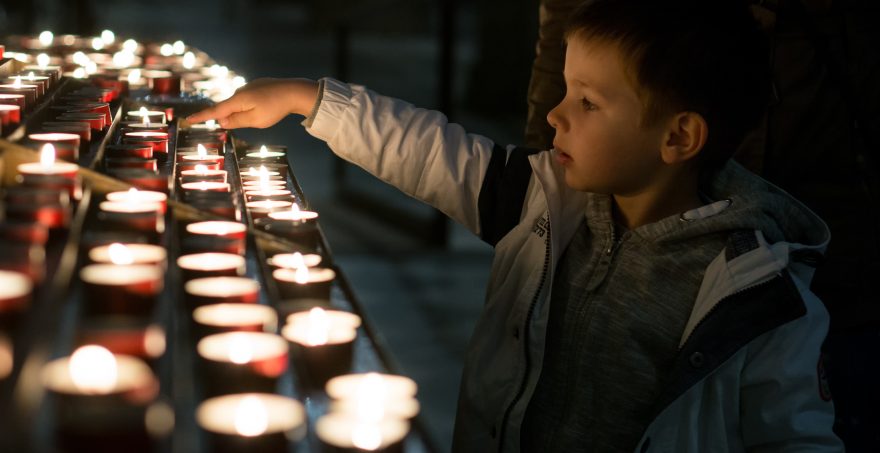“Is Today the Last Day?”: On Answering Big Questions and Trusting God’s Goodness
by Alexa T. Dodd

Not long ago, my oldest son, Ronan, asked us what happens to our bodies when we die. My husband, Joseph, explained the Resurrection of the Body in simple terms, describing how we will receive new bodies on “the last day.” At five years old, this explanation was enough for Ronan and he moved on without further questions.
But our three-year-old, Asher, overheard. Over the next weeks, he began to bring it up.
Is today the last day?” he would ask. “When is the last day?”
Once, he even said, “Mama, when it’s the last day, I want to do it all over again,” a sentiment that nearly broke my heart.
When we tried to explain to him that he didn’t need to worry about it, that Jesus would take care of him, he would say, “But the world is going to end,” in a despairing but resigned tone.
At this point, I began to seek the advice of his teachers at his Catechesis of the Good Shepherd program. How could we settle his very big worries when his understanding was so limited? I didn’t want him to live in anxiety, especially as I knew anxiety over spiritual things runs in our family.
The response of one of his teachers changed my perspective on the end times and the Last Things in a radical way.
Her advice was to make sure we were speaking of these topics with a spirit of joy and hope. She pointed out that we often focus on the Last Judgement while forgetting to contemplate what comes after it—new life, without mourning or pain, in the full presence of God. The separation of the body and soul is painful because it is not meant to be; but we are promised new, perfect bodies in Parousia (CCC, Second Edition, 1001).
Ultimately, she encouraged Joseph and me to contemplate and internalize the joy of these promises so that we could communicate that joy to our children. I realized that I had been subconsciously allowing my own anxiety about death to cloud the way I spoke to Asher. When he stated, “But the world is going to end,” I couldn’t contradict him, couldn’t offer comfort in a substantial way because in my heart I was also afraid of the world ending, of the radical loss of all my earthly comforts.
My melancholic disposition made it easy for me to focus on the elements of guilt and fear that can often take over our discussions of the Last Judgement. Joseph and I agreed that this was not the way we wanted to raise our children. At this age especially, the focus must be on God’s love for them, and His promises, so that they might move into a covenantal relationship with Him.
The next time Asher brought up the world ending, we paused and calmly explained that the world is not going to end in the way he feared. Rather, God is going to make a new, perfect world. We told him we would all be together as part of God’s family and there would be no pain. I could see him taking in these ideas, gauging his own trust in us.
A few days later, at the dinner table, he announced, “Jesus will make a new world with no booboos in it!” His joy was contagious.
Over this past Lent, I found myself contemplating these truths again, especially as we tried to guide our children through the practices of prayer, fasting, and almsgiving in an age-appropriate way. Meanwhile, I sought spiritual growth through the Hallow app’s Pray40 challenge, which focused on surrendering to God.
But as I moved through the reflections, I discovered a hesitancy deep within my heart. While I logically had no problem with surrendering to God, trusting in Him for everything, a part of me held back. On the surface, I fought back the mundane concern that I couldn’t simply “trust” God to do the dishes, the laundry, to pick up my kids from school. Below this temptation to self-reliance was the more pivotal worry that if I truly surrendered to God, He would allow something bad to happen to me or my family. Hadn’t bad things happened to all His saints, those who trusted Him the most? Wasn’t it cruel that He allowed those things at all?
Ultimately, I was battling with the idea that God is truly in control and truly good, that He can make good come out of any pain and suffering He allows into my life.
But I realized that this was the same fear that laced my discussion of the end of the world with Asher. My anxiety that God is not truly good—that His goodness and plans cannot overcome all the suffering of an ending world—came into my tone, my body language, and my words to my son.
So, this Lent, I realized that I also needed to rewire my brain when it came to surrender. Just as I cannot answer my son’s innocent but profound question, “Is today the last day?”, so too I cannot answer my own what-ifs: What if my husband lost his job? What if I can never achieve my career goals? What if one of my children got really sick? What if the people I love most were taken from me?
I cannot answer them. It is foolishness to think that by holding close to these worries, I can prevent their fruition.
I can only trust in God’s goodness. I can ask for deeper faith and greater joy—greater hope—that no matter what happens, God will provide me with the necessary grace.
And I can trust in His promise of a world “with no booboos in it,” where all these fears shall pass away.





